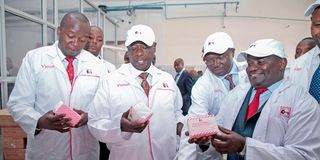Govt introduces reforms to modernise New KCC, expand market share

Deputy President Rigathi Gachagua flanked by New KCC chairman David Maina (left), Cooperatives and SMEs Cabinet Secretary Simon Chelugui (second right) and New KCC Managing Director Nixon Sigey during a a tour of the New KCC milk factory in Dandora, Nairobi, on June 27, 2023.
The government has introduced reforms to modernise the New Kenya Cooperative Creameries (KCC) factories and expand its market share to build capacity for dairy farmers.
Deputy President Rigathi Gachagua said the giant milk processor is to acquire new markets through the school feeding programmes sponsored by the national and county governments.
“The milk processor was brought down by conflict of interest and State capture despite being a government owned entity meant to serve dairy farmers,” said Mr Gachagua on Tuesday.
He said the reforms are aimed at empowering dairy farmers to increase milk productivity and earn better returns by pushing the cost of milk to Sh60 per litre at farm gate level.
The DP said the measures are part of the Government's efforts to transform the dairy industry and transform the state-funded entity to process milk to meet local market demands and for export for local consumption and export.
“Our aim is to turn-around the company to profitability by doubling the processed milk to over three million litres per for higher returns to the farmer,” said the DP when he toured the New KCC milk processing plant in Dandora, Nairobi.
The initiative, he said will double the contribution of the milk subsector to the Gross Domestic Product (GDP)to eight per cent.
He stressed the input of agriculture in job creation at household level noting that the sector contributes 22 per cent to the GDP and 27 per cent indirectly through linkages with other sectors.
The DP said with the capacity of 4.5 million litres per day, the New KCC has the potential to handle more milk from farmers and cushion them from exploitation from brokers who offer them low prices.
"Doubling the deliveries means we will improve our food security and multiply jobs from the current 750,000 to over 1.5 million. This is rather urgent in contributing to sorting out unemployment," he said.
The DP urged the company to lead in diversification to more valuable products beyond the powdering of milk and traditional products.
He was accompanied by Cabinet Secretary for Co-operatives And Micro, Small And Medium Enterprises (MSMEs) Development Simon Chelugui, New KCC Board Chairman David Maina and the Company Managing Director Nixon Sigei.
Also present were MPs James Gakuya (Embakasi North), Benjamin Gathiru aka Major Donk (Embakasi Central), Maina Mathenge (Nyeri Town), Joseph Cherorot (Kipkelion East).
The State processor is also banking on provision of extension services in all collections locations country wide to improve milk production.
The New KCC managing director Nixon Sigey said that the program entails supporting farmers to get nutrition, breeding and feed production.
He regretted that the cost of animal feed remains the most expensive input in the milk production accounting for 60 per cent of total cost thus affecting constant milk production.
“Our training is home grown fodder silage making and other protein sources which are cheaper. Feed conversation is critical in managing seasonality of weather patterns,’ added the MD.
He said that the training programme would enhance competitiveness in the dairy sector and facilitate the development of export strategy.
“We encouraging farmers on the choice of dairy breeds and to work closely with government agencies providing high quality semen like Kagric Kabete and ADC semen production centre which provides cheaper and quality semen,” said Mr Sigey, during Uasin Gishu Dairy cooperative farmers’ leadership meeting recently.
He explained that the support by New KCC and the national government on the provision of milk coolers has supported development of many dairy cooperatives.
The state processor is partnering with Uasin Gishu county on supporting cooperatives to enhance production and on school milk programmes.
He said that they are working on a programme to coordinate key value chains to enhance productivity and increase household incomes and create employment especially among the youth.
According to data from the county department of agriculture and livestock, the current annual production stands at 220million litres from 340,000 herds of livestock.
Uasin Gishu county governor Jonathan Bii said that the devolved unit was keen to revive cooperative societies to improve on production.
“We want to increase production to one billion litres annually to meet the demand. We want to revive all our cooperative societies to enable them to bulk their milk,” said Mr Bii.
This came even as dairy farmers Kenya Dairy Farmer Federation (KDFF) said that the quality of feeds and mineral salts sold in the market was of substandard affecting milk production and calving.
Stanley Ngombe, KDFF chairperson said that the minerals sold in the market had impacted negatively on production.
“Most cows are taking three to five years to get heat because of low quality feed and minerals. We need KEBS to step up regulation of the feeds and minerals sold to protect local farmers,” said Mr Ngombe.
He regretted that Kenya Dairy Board allowed importation of milk into the country in the month of April, which left unscrupulous traders to overstock the products thus affecting the milk prices.
‘What we need is a fund to cushion farmers against fluctuations in the market. The cost of feeding dairy cows is very expensive,” said Mr Ngombe.





